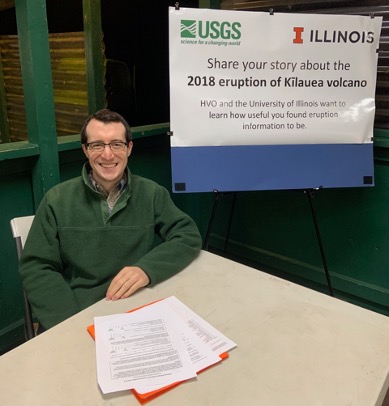Be Social: Science Communication during the 2018 Kīlauea Eruption
Robert Goldman
University of Illinois at Urbana-Champaign

- Date & Time
- Location
- Online-only seminar via Microsoft Teams
- Host
- Sara McBride
- Summary
The 2018 eruption of Kīlauea Volcano was the first natural hazard crisis event in which USGS social media communications played a major role in providing reliable, around-the-clock eruption information to publics. These communications complemented traditional channels including HVO’s website, radio and television broadcasts, newspaper articles, automated text or email alerts, and in-person community meetings. As part of my National Science Foundation Graduate Research Internship, I conducted two complementary investigations of these communications. First, I analyzed semi-structured in-person interviews conducted with residents of Hawai‘i in January 2020 to identify themes describing residents’ preferred sources, messengers, and channels of 2018 eruption information. I then analyzed the public comment threads of the @USGSVolcanoes Facebook page to determine how well dialogues between @USGSVolcanoes scientists and non-USGS users answered users’ eruption-related questions, addressed occurrences of misinformation, and benefitted users’ overall emotional state.
From this work, my collaborators and I identified the role that messengers’ perceived trustworthiness and credibility played in Hawai‘i residents’ reliance on information delivered by those messengers. We also learned that among the most frequently viewed @USGSVolcanoes Facebook posts, 73% of users’ questions were directly answered while 54% of comments containing misinformation were directly corrected or called out. Moreover, most users’ comments on the @USGSVolcanoes Facebook page contained positive emotions that reflect appreciation of the information provided by @USGSVolcanoes scientists. I conclude this talk by discussing the implications of our findings for planning future hazard communications in Hawai‘i and elsewhere.
Closed captions are typically available a few days after the seminar. To turn them on, press the ‘CC’ button on the video player. For older seminars that don’t have closed captions, please email us, and we will do our best to accommodate your request.
 Jump to Navigation
Jump to Navigation